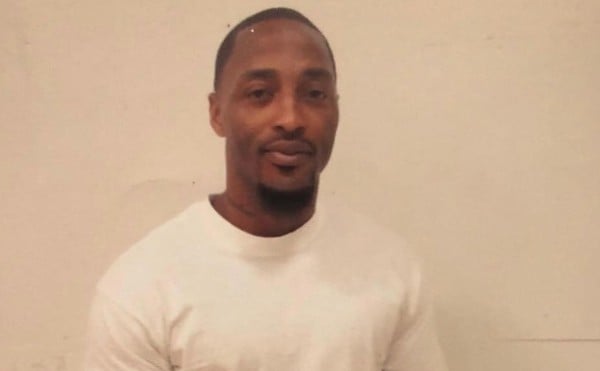"Every day I would go," Johnson says, "but I would sit outside the courtroom. I was there in the beginning, but the rest of it was just too hard for me. It was too hard."
But she made sure to watch the end of the case against William Jefferson, accused of firing four shots into LaTanya's 1998 Lexus SC300 during a failed carjacking attempt on April 30, 2000, including one that pierced her heart. After less than three hours of deliberation, the verdict was in. But as the words rang out, Johnson couldn't believe what she heard: "Not guilty."
"I was shocked," Johnson says. "My first reaction was, 'No one gets to pay for this. She died, and no one gets to pay for this crime.' The whole family was in total shock."
For those who knew and loved LaTanya and hoped the trial would bring finality to her tragic case, the verdict instead brought new questions and anguish. After spending nearly a year in jail, LaTanya's alleged killer was set free while, at the same time, the jury sent a message that his co-defendant -- who plea-bargained in exchange for his testimony -- was not to be believed. An already puzzling murder case was made only murkier.
LaTanya was born and raised in East St. Louis, the daughter of 33-year veteran elementary-school teacher Ella Mickles, and she longed to follow in her mother's footsteps. She graduated from East St. Louis High School in 1984 and attended Southern Illinois University-Edwardsville, where she obtained her bachelor's and master's degrees. She had recently applied to the doctoral program at St. Louis University. Her sister remembers LaTanya's single-minded determination, even as a young child, to become a teacher: "That's all she ever wanted to be, ever since she was a little girl -- 'I want to be a teacher. I want to be a teacher.' She loved children so much."
She taught for years at an elementary school in Cahokia before her career took her to Rock Island, Ill., and, later, Naperville, Ill., where she was an assistant principal. Johnson says LaTanya valued the experience but longed to come home. "The children there were basically well-to-do," Johnson says, "and she really couldn't reach them the way she wanted to reach the poor, disadvantaged children of East St. Louis. She always said they needed her more than the children in Naperville did, so the knowledge that she acquired in Naperville, she took all that back to East St. Louis."
LaTanya had been back in St. Louis less than a year when she died, working as assistant principal at her alma mater, East St. Louis High. She married Gary Hamlin, whom she'd known for several years as an acquaintance before their relationship turned serious, in August 1999. And though her mother and father had died in the years preceding her return, LaTanya was thrilled to be living near relatives, including her sister and niece, and was excited about her new job. "She was ecstatic," her sister says. "She loved it, she absolutely loved it, because she was home. It was all she talked about." LaTanya lived five minutes from her sister, and every morning she took her niece, Jasmine, to school, because her sister's job started early. The night she died, she had just dropped Jasmine at her sister's and was headed home.
Johnson remembers the moment police delivered the bad news: "I thought it was random; that's the first thing that went through my mind. I thought it was odd for the area I lived in and odd for a Sunday night. Then when he said someone tried to rob her in an attempted carjacking, my first thought was: 'Really?' It struck me very odd. That sort of thing just didn't happen in that neighborhood. I thought it was odd to happen on a Sunday night in my neighborhood. But I accepted what they said."
From the start, St. Louis police said they suspected LaTanya's murder was the result of a failed attempt at carjacking while she was paused at a stop sign at the corner of Hickory Street and Missouri Avenue around 9:30 p.m. About three weeks after LaTanya's murder, police announced that they'd charged two men in connection with the crime: William Jefferson and Damian Cotton, both 18 and both from East St. Louis.
St. Louis police arrested the two after receiving an anonymous call from someone claiming to know who was responsible for LaTanya's death. The caller said four men from East St. Louis were involved, along with a fifth who had planned to go along but backed out at the last minute. That call led police to Dante Cole, who told them he knew about the murder but said he had not gone along. He said a friend, Jared Mason, told him he had driven three others to St. Louis and, while Mason and another man, John Johnson, stayed in Mason's car, two others went to steal LaTanya's Lexus. He said he learned secondhand that when LaTanya refused to get out of the car, she was shot.
Police questioned Mason, who told a similar story. Police picked up Cotton and Johnson; both denied any knowledge of the murder. But after being asked to speak to one another, alone, for about 10 or 15 minutes, they admitted to police they knew about the crime, and both said the triggerman was someone named Rooster. Cotton later identified Rooster as William Jefferson, someone he knew from grade school. Cotton told police that he was standing on the passenger side of the Lexus when Jefferson, who was standing on the driver's side, fired the fatal shots. There were no other eyewitnesses.
Police never recovered the gun used in the killing. There were no fingerprints, no physical evidence at all but for the recovered bullets and shell casings. Only two of the four men who said they were in the car that night were arrested. Jefferson was charged with first-degree murder and armed criminal action; Cotton was charged with second-degree murder and armed criminal action.
Assistant Circuit Attorney Michael Ravetta, who prosecuted the case, says the decision on whom to charge was based "on the statements of witnesses and what they knew and how they were involved. Basically, the one kid claimed -- and I have no reason to doubt him -- that he had no idea why they wanted to go over there, and he was the driver of the car. He indicated they asked for a ride and he drove them over there; he didn't know what was going on. Another kid, when they were talking about it, backed out and didn't go; he left and went to his girlfriend's house. The third guy, he ended up being wanted for robbery on the East Side, and the other two guys were defendants."
Cotton faced up to 30 years in state prison on the charges. In February, he agreed to plead guilty in exchange for a 10-year sentence and his testimony against Jefferson. Ravetta says the case against Jefferson rested on the word of Cotton, who testified at the March trial, and says he was surprised when the jury returned with a not-guilty verdict.
"The only thing I can figure is, they did not believe the co-defendant who we cut a deal with. The co-defendant [Cotton] was the only eyewitness; the others did not see the actual shooting. The only person who could tell us who pulled the trigger was Damian Cotton. It all came down to believing Damian Cotton, and evidently they didn't. We even blew [Jefferson's] alibi and they still walked him, so I have no idea what that was all about, except they didn't believe our witness."
The lawyers who defended Jefferson were not as surprised.
Michael Mullen, a former defense attorney who was sworn in as a circuit judge in June, says Jefferson had an alibi -- he and his sister's boyfriend said they were out driving around together that night, showing off his sister's boyfriend's new car. And although Jefferson knew the other men implicated in the case from junior high, he told the jury that he never hung out with them. They were actually in rival gangs while in school. Mullen thinks his client was a "convenient scapegoat" because the others knew he had recently served time for a robbery conviction. "He had not been out very long, and he tried to get his life back together. These other kids knew he had been locked up for the past year on something. The jury knew he had a record, because he testified, and they still didn't believe the other kids' version.
"I believe there were certainly some of these kids who were involved that testified against my client -- they admitted their own involvement, but they all kind of said, 'I was there,' but then put it off on my guy as being the main guy. And my guy said, 'I don't even hang out with these people, and I'm probably a rival of theirs, and all these kids admit it.'" If they were members of rival gangs, he asks, "then why would he be hanging out with them?"
The lawyer notes that the jury "came back fairly quickly on a murder, especially one where the victim was so sympathetic. This wasn't a drug murder. This was someone who was truly helping the community, giving back to the community."
Mullen, a former prosecutor, says he was puzzled that only two people were charged when five were implicated in the scheme: "I felt very strongly they charged the wrong people, and they mischarged the case. One kid said he drove over to the carjacking and claimed he didn't even know what was going on -- when all of the other people were saying he knew what was going on and was going to split the profits from the carjacking. Yet the guy who drove to the carjacking where someone gets murdered doesn't even get charged, even with a misdemeanor. Dante Cole, who also was involved, indicated he was in on the plotting of this in East St. Louis but he backed out of it. That was the excuse for not charging him. And there was another guy -- a guy nicknamed 'Killer' -- who apparently was in the car but never testified; they never charged him with anything. It just seemed strange."
He believes the gist of what the others claimed was true -- they did plan a carjacking that went awry and someone was killed. "It's pretty easy to change just one piece of the story and say everything I'm saying is true," Mullen says, "but this other person was the killer, and then just [Jefferson] in there as a convenient scapegoat."
Lawyer Mathew Hoffman tried the case with Mullen. "When we sat down and took the case, it didn't seem to add up," Hoffman says. "From the beginning the state's evidence was questionable. They had no eyewitnesses, no weapon, and the only motive they could come up with was a carjacking, and that wasn't linked to our guy except through the alleged co-conspirators." The jury, he adds, "just didn't believe these guys. It sounds like there was a conflict between these rival gang members ... and it sounds like they were trying to pin this on [Jefferson]."
The only person likely to serve any time for LaTanya's murder is Damian Cotton, who pleaded guilty in exchange for a 10-year prison sentence. In letters to the judge in his case, Cotton's mother and the senior pastor at his church describe him as a young man, 17 at the time of the murder, with no prior criminal record who had obtained his GED, was attending community college in Belleville and held several part-time jobs, including one in the campus bookstore. The pastor, Rev. Rex Waddell of the Church of the Living God in Fairview Heights, noted that Cotton's "teachers, pastors and various friends and supporters" chipped in to pay for his defense.
His mother, Diane Cotton, described her son as "very kind and intelligent ... We all believe in Damian's innocence and we all know that he is just a person who witnessed a crime and has never harmed another human being because of his love for people and his very kind, loving nature."
Cotton's attorney, William Ekiss, says his client "has been more than forthright in standing up for his responsibility in this case, and it's still his position that Mr. Jefferson shot this woman, and he testified to that. Now, what a jury wants to perceive to believe ... Obviously they didn't believe that, because Jefferson was found not guilty. But the only witness to this claim and this shooting was Damian Cotton.
"He did the right thing by standing up for himself and owning up to his responsibility. Mr. Cotton made a statement to police after it happened. Mr. Jefferson did not. Everybody did but Jefferson. If he was so innocent, why didn't he admit his innocence then?"
Cotton has been free on bond since December. And even though his testimony in the Jefferson case was not persuasive, his plea bargain stands. "We offered him the deal to testify, and it had nothing to do with whether we won or not," says Ravetta, the prosecutor. Cotton has yet to be sentenced; Ravetta expects sentencing to take place in the next couple of months.
The chain of events has done little to clarify what happened the night LaTanya was killed or precisely who is responsible. For some of LaTanya's relatives, the case never made much sense. It still doesn't.
"I didn't take too much of that nonsense," says LaTanya's aunt Edith Mickles, referring to the police theory of how and why her niece was killed. "I thought it was just a bunch of bunk. I didn't believe those boys did it. Those boys are from East St. Louis, and [LaTanya's] car was parked on the East Side every day. If they wanted to steal a car, they didn't have to go to her neighborhood."
Another relative shares her concerns: "We didn't feel enough investigative work was done," he says. "It just didn't seem right. Things didn't seem to add up as far as how everything went down and the nature of the alleged carjacking. They didn't take the car; they didn't attempt to take the car. They said she was shot four or five times through the front window with a high-powered weapon. That doesn't indicate any kind of carjacking." Plus, he adds: "It was a high-profile case; therefore people were pressuring detectives to come up with motives and leads."
Rochelle Johnson, LaTanya's sister, says she doesn't doubt that police or prosecutors were right in whom they decided to charge; she believes they simply lacked enough evidence to conclusively prove the charges. Still, she has chosen not to dwell on the criminal case, instead focusing on the LaTanya Hamlin Scholarship Foundation (P.O. Box 16821, Clayton, MO 63105), which raised $14,000 last year and awarded three $2,500 scholarships. The scholarship is for underprivileged students in East St. Louis with average grades who aspire to go to college.
"Prior to the verdict, we got together and we prayed and we asked for God's will to be done, not our will," Johnson says. "We could have prayed for [Jefferson] to die or go to jail forever. I really, really prayed real hard before the verdict came out, so once it was read, we have such faith in God, that God let me know: 'Vengeance is mine.' Whoever did it, it will come out. The way we put it is, 'This is man's courtroom, but God is in charge.' We let it go -- we really did. We forgave everybody who was involved, and we just moved on with our lives."





